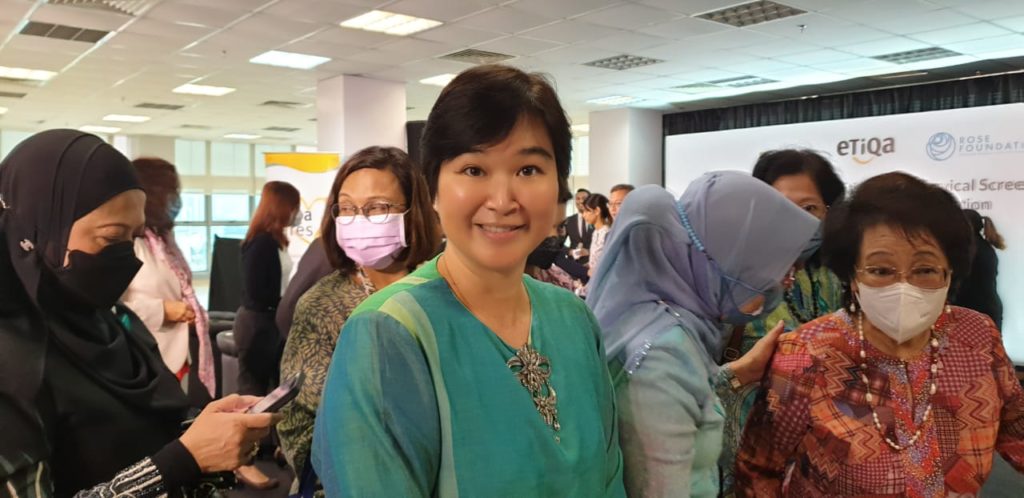
KUALA LUMPUR, Jan 11 – Malaysia, which embarked on a vaccination programme in 2010 for the Human Papillomavirus (HPV), the major cause (99 percent) of cervical cancer, has demonstrated a 90 percent reduction in the related HPVs, the first country in South East Asia to have done so, said Professor Dr Woo Yin Ling, Medical Technical advisor and Trustee of ROSE Foundation.
More than 10 million doses of vaccination have been given and over the 10 years since the programme began, there has been a 90 percent reduction in the HPV 16 and 18, which are the major causes for cervical cancer, Dr. Woo said at a press conference following the launch of the Phase 3 of Etiqa’s Free Cervical Screening Programme with ROSE Foundation here on Tuesday.
Dato’ Seri Dr Wan Azizah Dr Wan Ismail, Patron of PUSPANITA (Wives of Civil Servants and Women Civil Servants Association) officially launched the programme, which forms part of the continued and concerted efforts by the ROSE Foundation, established in 2019, to eliminate cervical cancer in Malaysia.
Explaining the link between the HPV and cervical cancer, Dr Woo pointed at how the multi-pronged approach of screening as many women as possible for HPV, treating those who have tested positive, while vaccinating the younger women, could effectively eliminate cervical cancer altogether in the not too distant future.
Prior to the press conference, Dr. Woo also demonstrated the workings of the mobile colposcopy developed under the Program ROSE ( Removing Obstacles to Cervical Screening), with the funding of Etiqa, to expand its outreach to rural areas and enable on-site medical treatment for women tested positive with HPV.
In her speech earlier, Chair of Rose Foundation, Dato’ Dr Adeeba Kamarulzaman, said the mobile colposcopy device, funded by Etiqa for the phase 3 of the cervical screening programme, is expected to make a difference for these women.
The screened women in rural or interior areas, however, may decline treatment for various reasons, such as concerns about the cost of treatment or distance to the nearest government hospital and the expense of travelling there.
The immediate onsite treatment includes an initial assessment by the mobile colposcopy device that produces high quality images of the cervix.
“The device can be connected to a smartphone for easy visualisation to support remote consultation if required. Upon assessment, patients with pre-cancer virus will be treated at the location using a Portable Thermal Coagulator. Apart from providing innovative solution to detecting pre-cancer-causing HPV viruses in women, the programme will now empower women to get themselves treated, which will eventually help to save more lives,” Dr. Adeeba said.
Since its formation, the ROSE Foundation has successfully implemented an innovative cervical screening program that allows women to take the HPV PCR self-sampling test in a simple, quick and painless way compared to the conventional pap smear.
As at end of Dec 2022, Program ROSE has screened over 21,000 women nationwide with 1,210 positive cases detected and over 90 percent have been linked to care.
“Program ROSE will continue with our outreach drive such as working with the community leaders or collaborating with related fraternity to ensure we achieve a wider screening of under-served and underprivileged women in remote areas. Thus far, Program ROSE has been introduced to over 150 health clinics across 12 states. 28 ROSE-friendly government hospitals with over 90 healthcare professionals are now engaged to provide follow-up treatment for the women who have tested positive through our programme,” Dr. Woo said.
Meanwhile, CEO of Chief Executive Officer of Etiqa Life Insurance Berhad, Paul Low, said the insurance company will continue to make the programme more accessible and affordable as at low as 40 sen daily for women from all sectors.
“Etiqa has always been dedicated to serving our community and our customers. We are proud to play an instrumental role in supporting the vision of seeing more women become aware of the perils of cervical cancer and taking steps towards getting themselves screened. This programme has been designed so that women are able to carry out the simple procedure themselves by using a swab, thus ensuring privacy.”
–WE